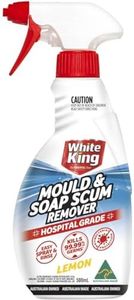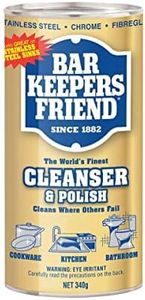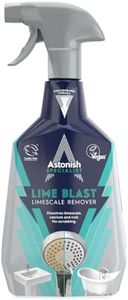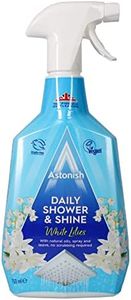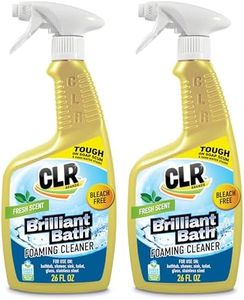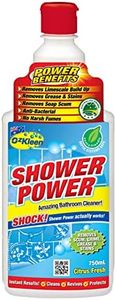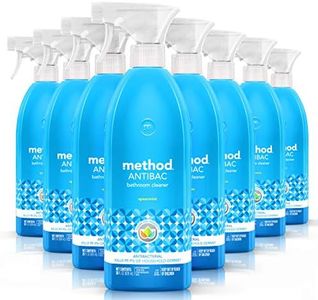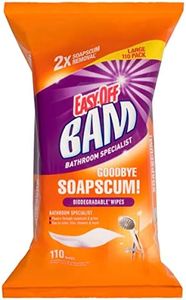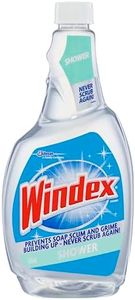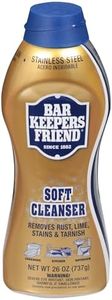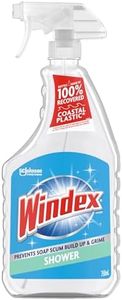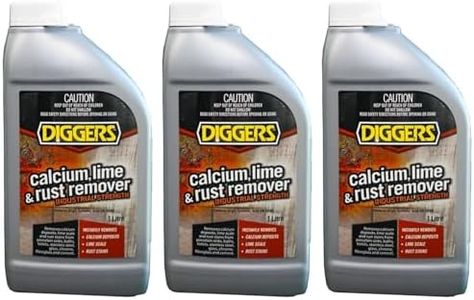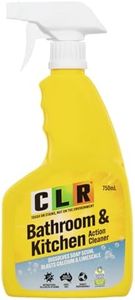We Use CookiesWe use cookies to enhance the security, performance,
functionality and for analytical and promotional activities. By continuing to browse this site you
are agreeing to our privacy policy
10 Best Soap Scum Cleaners
From leading brands and best sellers available on the web.By clicking on a link to a third party's website, log data is shared with that third party.
Buying Guide for the Best Soap Scum Cleaners
Choosing the right soap scum cleaner can make bathroom and kitchen cleaning much easier and more effective. The right product will break down and remove tough calcium or fat deposits left by soap and water, keeping surfaces sparkling and reducing cleaning time. To pick the best cleaner, it’s helpful to look at a few important details that determine how suitable a cleaner is for your surfaces, how safe it is for people and pets, and how easy it is to use. Think about the type of surfaces in your home, your cleaning habits, and whether you have any sensitivities to chemicals or scents. Here are the key specs and what they really mean for your cleaning needs.Type of Surface CompatibilityThis spec tells you what surfaces the cleaner is safe for, such as tile, glass, fiberglass, metal, or natural stone. It's important because a cleaner made for one kind of surface might damage another, like using something too harsh on delicate glass or marble. Cleaners are usually labeled clearly for use on ‘all bathroom surfaces’ or for more specific areas like glass, shower doors, or tub tile. Make sure to match the product to the surfaces you'll clean most often – if you have lots of specialized finishes, like natural stone, look for a product explicitly safe for those. If your surfaces are mostly standard tile or glass, most general use cleaners will be suitable.
Cleaning StrengthCleaning strength reflects how powerful and fast-acting the formula is against built-up soap scum, mineral deposits, and grime. This spec matters because tough build-up needs a stronger, sometimes more corrosive, formula, whereas light residue can be handled with milder products. Cleaners can be divided into light-duty (good for regular maintenance), medium-duty (for moderate soap scum), and heavy-duty (for very stubborn, thick deposits). If you clean often and have minimal build-up, light or medium strength is usually enough. For occasional deep cleans or tackling long-ignored areas, a heavy-duty product might be necessary, but always consider your surface type and follow label directions to avoid damage.
Ingredients and SafetyThe list of ingredients in a soap scum cleaner reveals if it's bleach-based, acid-based, or uses natural agents like vinegar or lemon. This is critical for health, safety, and environmental concerns. Strong chemicals can irritate skin and lungs, while natural formulas are generally gentler and safer around pets and kids. Values range from natural and non-toxic, to standard chemical-based, to industrial-strength options. If you or your household have sensitivities, go for cleaners labeled as non-toxic or hypoallergenic. If you want fast, powerful results and don’t have sensitivities, traditional chemical cleaners are usually effective but always use them in well-ventilated spaces.
ScentScent refers to the fragrance left behind after cleaning, ranging from strong chemical odors to light citrus or unscented. This is important if you are sensitive to strong smells or if you want your bathroom to smell fresh after cleaning. Cleaners come in unscented, mild fresh scents, and heavily fragranced. If you dislike lingering smells, stick with unscented or mild options. Those who enjoy a fresh-scented room after cleaning might prefer products with added fragrance.
Ease of UseEase of use covers how the product is applied and how much effort is needed, such as spray-and-wipe, foams, or gels that cling to surfaces. Some require scrubbing, while others just need rinsing after a set time. Simpler application is important for daily cleaning routines, while tougher products may need more effort or protective gloves. If you want quick and easy cleaning, look for sprays you can wipe away with little or no scrubbing. For deep cleaning, you may need to choose a product that requires some extra work.
Environmental ImpactThis spec shows whether the cleaner is biodegradable, septic-safe, or made with eco-friendly packaging. It’s important if you’re concerned about environmental footprint and water safety. Products can be regular cleaners, biodegradable cleaners, or certified eco-friendly. Eco-conscious buyers should look for labels like ‘biodegradable’ or ‘environmentally friendly,’ while those focused mainly on cleaning performance might not mind conventional formulas.
